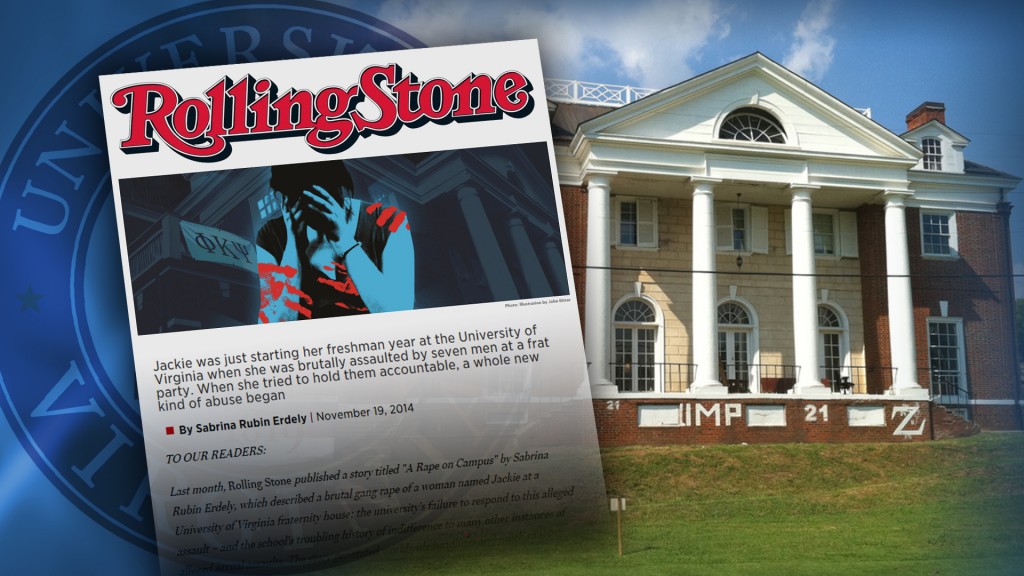U.VA Jackie withholds her emails citing her dignity, after destroying fraternity’s diginity
Discredited U. VA Jackie is fighting efforts to access her email and texts. Read the story below.As legal wrangling in the aftermath of a discredited Rolling Stone exposé of rape culture at the University of Virginia escalates, court records show that the woman at the center of the 9,000-word feature is not cooperating.
“Jackie,” the former U.Va. student who was the subject of the piece, has yet to turn reams of correspondence over to lawyers who represent a university dean they say was cast as the “villain” of the story. They requested the records in July.
Days after a third multimillion-dollar suit was filed over the story, counsel for Dean Nicole Eramo asked a judge to force Jackie to comply over the objections of her lawyer, Palma E. Pustilnik, who wrote in court filings that disclosing personal communication would violate Jackie’s “privacy and dignity” and subject her to “extreme harm.”
Many of the requests filed in July by lawyers with Clare Locke LLP are overly broad or cover privileged communication, Pustilnik wrote in a 16-page motion opposing disclosure. She declined an interview request.
Eramo’s lawyers seek, among other things, access to Jackie’s correspondence with story author Sabrina Rubin Erdely and the magazine; email, message board and social media postings Jackie made that reference being the victim of a sexual assault at U.Va.; and communication about the alleged assault with Jackie’s friends and members of a support group for sexual assault survivors.
A hearing in the matter is scheduled for Friday in Alexandria, according to court records.
Jackie largely withdrew from the public sphere as her account of a graphic September 2012 gang rape at the Phi Kappa Psi fraternity house at U.Va. began to unravel. Her story formed the backbone of Erdely’s “A Rape on Campus,” which also took aim at the university’s handling of her claim.
Lawyers representing Eramo in her $7.5 million defamation suit against Erdely, the magazine and parent company Wenner Media argue in court filings that Eramo’s “sterling reputation as a fierce advocate and supporter of sexual assault victims was destroyed” as a result of the story and ensuing media firestorm.
“The article claims that after Jackie reported her assault to U.Va., Dean Eramo abused Jackie, discouraged Jackie from reporting her gang rape, intentionally coddled Jackie into doing nothing, and took no action in response to Jackie’s report — all, allegedly, to protect U.Va.’s reputation,” a motion in support of the subpoena states.
Pustilnik asserts in a motion opposing the subpoena that Jackie should not be dragged into Eramo’s court proceedings against the publication because she is not a named party to the suit. But the communications in question speak directly to what the magazine should or should not have known about the credibility of its star source, according to Thomas Clare, a lawyer for Eramo.
“The documents sought by the subpoena will demonstrate that Rolling Stone’s story about Jackie is false and that, to the extent Rolling Stone claims it was relying on Jackie’s credibility, Rolling Stone knew or should have known that Jackie was not a reliable source on which to base the article,” he wrote in court filings.
Clare did not return an interview request.
Rolling Stone ultimately retracted the story; magazine editor Will Dana resigned. Investigations by the Charlottesville police and Columbia University journalism school did not find evidence to support Jackie’s account of a being raped by several fraternity brothers as an 18-year-old first-year student.
The Virginia Alpha Chapter of Phi Psi filed a $25 million suit against the magazine Nov. 9 in Charlottesville Circuit Court; three fraternity brothers individually filed a defamation suit against the publication in New York federal court in July. Eramo was the first to file, in May.
Eramo grew increasingly frustrated and “overwhelmed” as U.Va.’s Grounds roiled in the immediate aftermath of the article’s publication, emails obtained through an open records request show. Prohibited from contacting Erdely by communication officials and swamped with media requests for comment, Eramo asked U.Va. officials to tell reporters about her 18 years “devoted to the care and well-being of University of Virginia students.”
“I do not plan to do any interviews because they would be counterproductive and while the reporters are promising to ‘let my voice be heard’ I know that I cannot trust that to happen,” Erdely wrote.
The week the article was published online, Eramo suggested sending a brief statement to media outlets referencing the story’s “mischaracterizations” of her.
As questions arose surrounding the account’s veracity, she urged communications officials to “strike while that iron is hot.”
The administration did not openly contest elements of Jackie’s story in the immediate dust-up as broader conversations about campus sexual assault unfolded.
The nationwide debate that ensued at times became overshadowed by revelations about the veracity of Erdely’s reporting. In the chaotic interplay between the issue of campus sexual assault and issues with the story, friends and acquaintances of Jackie — some of whom had participated in the story — told media outlets she had offered them different accounts of what happened Sept. 28, 2012.
Eramo’s lawyers say in court filings that accessing information about those discrepancies is critical to their case.
“(Jackie’s) objection that disclosure would intrude upon her ‘privacy’ is meritless,” Clare wrote in an Oct. 30 letter to Pustilnik. “As noted, (Jackie) voluntarily discussed her supposed sexual assault with Rolling Stone magazine knowing full well that this information would be published nationally in a prominent publication.”
Eramo has agreed to withhold Jackie’s last name from court filings at Pustilnik’s request, her attorneys say, in an attempt “to cooperate in good faith.”
Source: K. BURNELL EVANS Richmond Times-Dispatch

